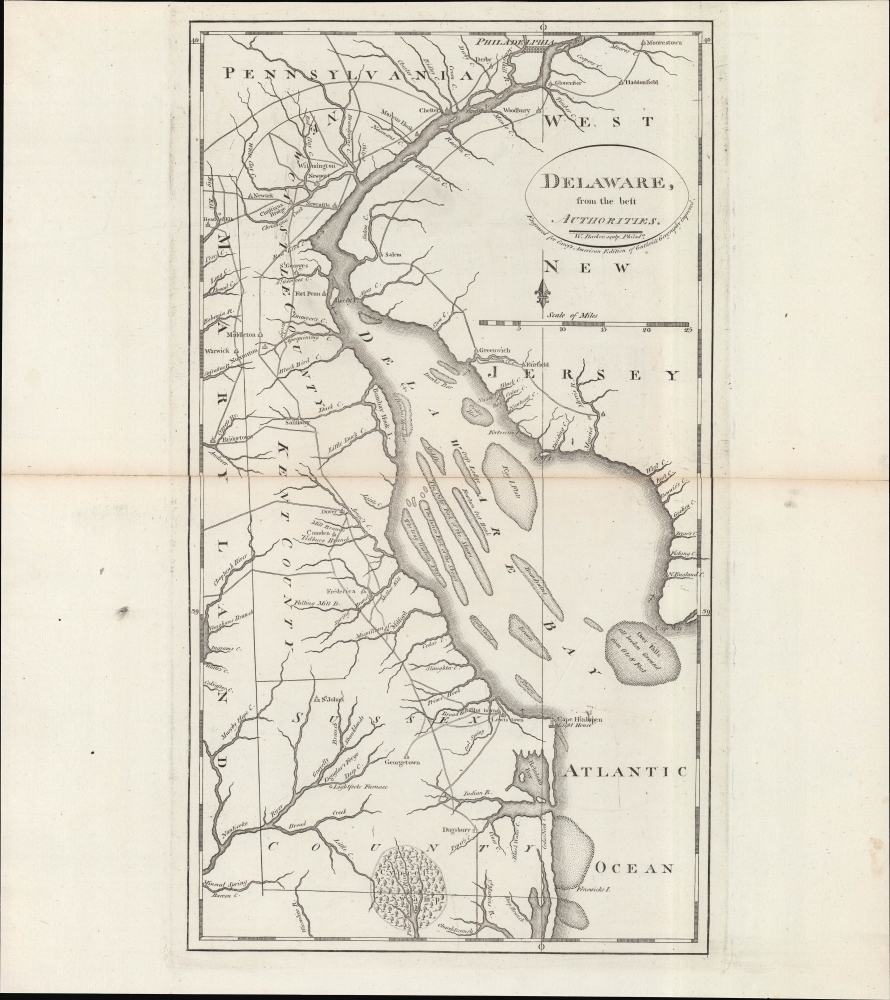1795 Carey / Barker Map of Delaware
Delaware-carey-1795
Title
1795 (undated) 16 x 9 in (40.64 x 22.86 cm) 1 : 443529
Description
A Closer Look
Delaware is presented along with portions of Maryland, Pennsylvania, and 'West New Jersey,' retaining the nomenclature of New Jersey's earlier colonial-era division. Roads, towns, counties, major bridges, and other features are indicated. Philadelphia, the national capital at the time of publication, appears near top. Several town names changed in the years after the map's production, including Fort Penn (Port Penn), or disappeared, as with Noxonton and Pilottown, later incorporated into Lewistown (Lewes). Waterways and swamps are labeled throughout, and in Delaware Bay, islands, shoals, flats, and anchorages are recorded.The Cape Henlopen Lighthouse is illustrated at the bottom-center. Completed in 1767, it was the sixth lighthouse built in the American colonies. British troops damaged the lighthouse during the American Revolution, but it was repaired by 1784. By the early 20th century, the lighthouse was falling into disrepair and threatened by coastal erosion. It fell into the sea during a storm in 1926.
Publication History and Census
This map was engraved by William Barker for inclusion in Matthew Carey's Carey's American Edition of Guthrie's Geography Improved, published in Philadelphia in 1795. The same map also appeared in the overlapping Carey's American Atlas, published soon afterward. Regardless of printing, it is independently cataloged among the holdings of seven institutions in the OCLC and is scarce to the market.CartographerS
Matthew Carey (January 28, 1760 - September 16, 1839) was a Dublin born publisher who established himself in Philadelphia in the late 18th and early 19th century. A young man of socially progressive views, Carey's first known publication, produced when he was but 17 years old, was a pamphlet criticizing dueling. Another pamphlet, issued in the same year, attacked the Irish penal code. Shortly afterwards, in 1779, legal issues, possibly arising from his liberal political activism, forced Carey to flee to Paris. In Paris, Carey had the good fortune to befriend the visiting American diplomat and founding father, Benjamin Franklin (1706 - 1790). As an Irishman chafing under the rule of England, Carey sympathized with and admired the American revolutionary. The liberally minded pair struck up a lifelong friendship and Carey was hired to work at Franklin's press in Passy, France. A year later, Carey returned to Ireland and resumed his politically provocative publishing career with The Freemans's Journal and The Volunteer's Journal. It didn't take long for political pressure to once again force Carey from Ireland - this time to America (1784). Although largely without funds, Carey convinced Gilbert du Motier, Marquis de Lafayette (1757 - 1834), who he knew from Franklin's Paris circle, to lend him funds to establish a new publishing concern in Philadelphia. Despite this loan, Carey's firm remained under financed and opened on a shoestring budget. It was most likely his limited budget that led Carey to some of his most important publishing innovations. At the time cartographic publishing was dominated by large printing houses in London and Paris where most, if not all, of the work was completed in house. Without the finances to emulate this large publishing houses, Carey was forced to outsource much of his publishing work. This set the stage for subsequent American publishers who, in order to compete effectively with European firms, relied on an often bewildering network of alliances and collaborations. Carey was also a master of republishing many of his own maps in multiple different atlases and formats to maximize their profitability. His most important work is without a doubt the 1795 issue of the American Atlas the first atlas to be published in America. Carey died in 1839 but was succeeded by his son Henry Charles Carey (1793 - 1879) who, in partnership with his brother-in-law Isaac Lea (1792 - 1886), published numerous important maps and atlases under the Carey and Lea, Lea Brothers, and Lea and Blanchard imprints. More by this mapmaker...
William Barker (June 29, 1770 - April 19, 1805) was an engraver active in Philadelphia un the late 18th and early 19th centuries. Barker was born in Philadelphia, the son of Elihu Barker (17?? - 1792). Both father and son worked for the firm of Mathew Carey (1760 - 1839) and engraved maps for Carey's American Atlas, considered the first general atlas published in America. He appears in Philadelphia directories for 1795 - 1796 and 1800 - 1809. His business may have been carried on by a son of the same name, but it is unclear. Learn More...
William Guthrie (1708 - March 9, 1770) was a Scottish historian, journalist, and writer. Born in Brechin, he studied at Aberdeen University with the idea of becoming a parochial schoolmaster. Instead, in 1730, he elected to settle in London and try his hand at literature. He covered parliamentary debates f or the Gentleman's Magazine and soon earned a reputation for being a political writer. He published several scholarly works, including a History of England from the Invasion of Julius Caesar to 1688 in four volumes, and, most notably, his Geographical Historical, and Commercial Grammar. Learn More...

